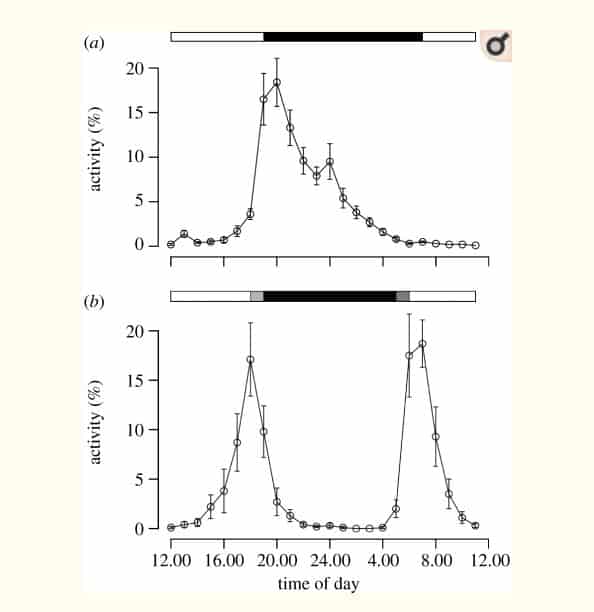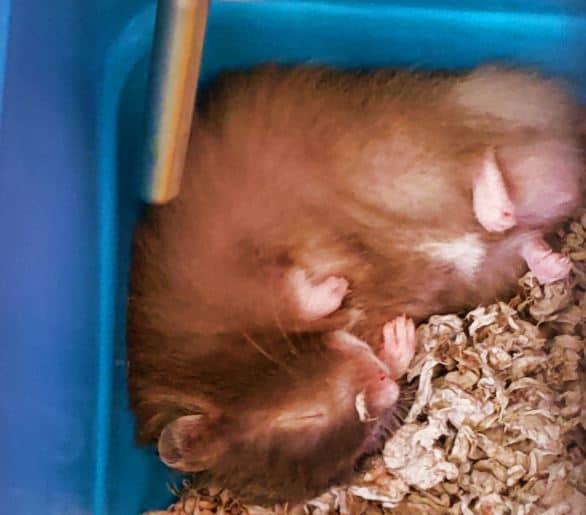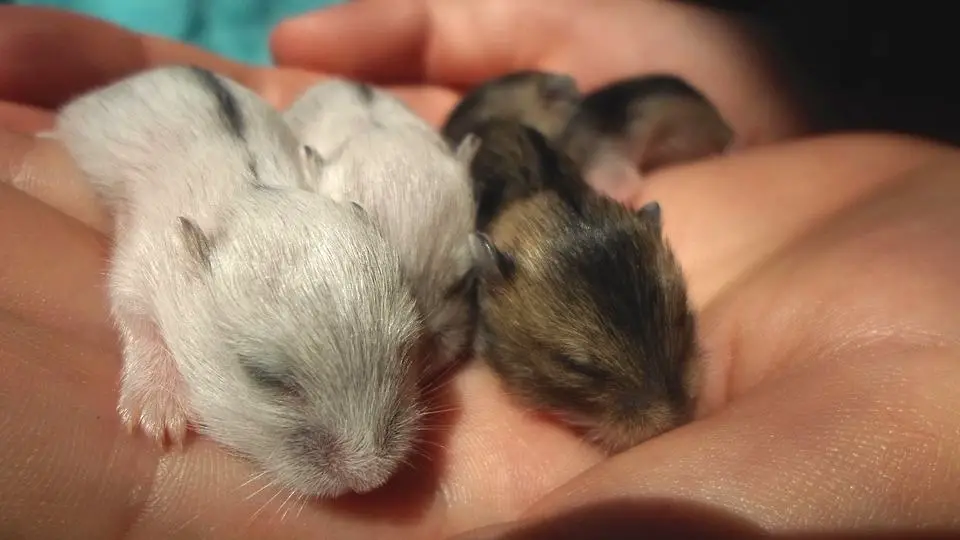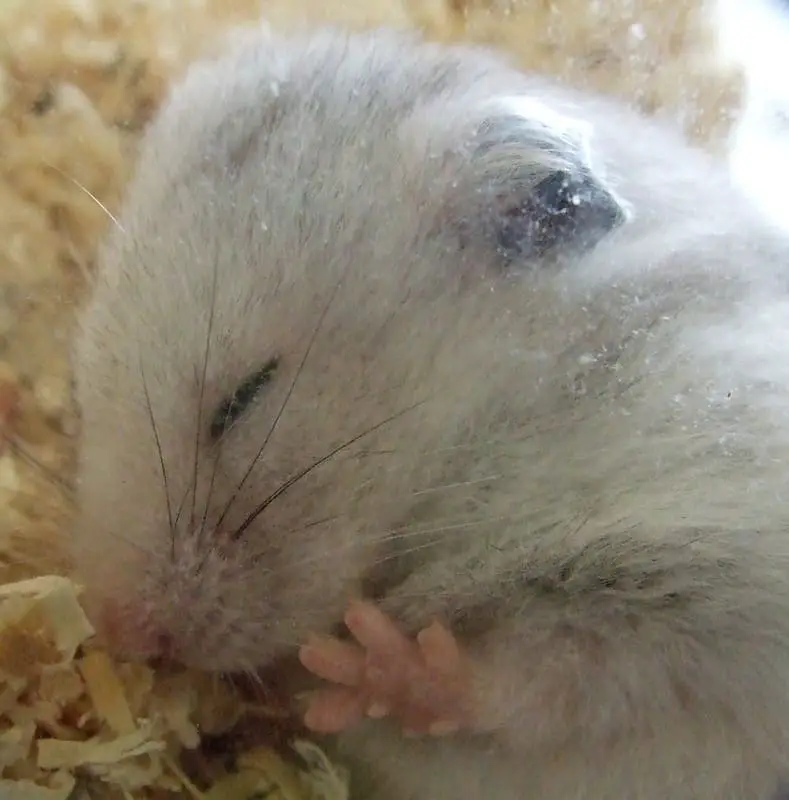Owning a hamster as a pet is a fun and rewarding experience. However, while it’s definitely fun, it also brings with it a lot of questions. Many hamster owners have a wide range of different questions about their furry companions. One particular aspect of hamsters that many people are unsure about is their sleep. People often wonder when hamsters sleep, how long they sleep, whether they dream, and many other things.
These questions are very normal to have, and the answer can sometimes be hard to find. To remedy that, I’ve created a complete guide on hamster sleep. This guide will take you through all the most important aspects of your hamster’s sleep.
So, if you’re filled with questions about your hamster’s sleeping habits, you’ve come to the right place, because this guide will answer them all. Let’s get into it.
Hamster sleep 101: The basics
Let’s begin this guide by taking a closer look at why hamsters sleep.
Hamsters sleep for the same reason that we humans do: rest, energy conservation, and bodily restoration. In addition, studies have shown that hamsters spend about the same amount of time of their sleep in the REM (rapid eye movement) phase as humans do, about 25%.
The interesting difference between us and hamsters is that hamsters have what’s called a polyphasic sleep-wake pattern, meaning that they sleep multiple times per day, whereas humans only sleep once. In addition, hamsters sleep much longer than humans.
Are hamsters nocturnal, diurnal, or crespuscular?
There are 3 different sleeping habits that almost all animals fall under:
- Nocturnal: awake during the night, asleep during the day.
- Diurnal: awake during the day, asleep at night.
- Crespucular: awake at twilight (dusk and dawn), asleep during the day and night
While most people believe that hamsters fall under the nocturnal category because they often see them being active when it’s dark, that’s not actually true, at least not for wild hamsters.
According to Erin Ramsey, co-president of the California Hamster Association in Southern California, hamsters are actually crepuscular; awake at twilight and asleep during part of the day and part of the night.
The reason why hamsters are crepuscular is quite simple. In the wild, they often live in extreme desert climates. Deserts are very hot during the day, which is when hamsters are asleep in their cooler burrows. However, at night, deserts are extremely cold, too cold for your hamster to go out and forage for food.
Hamsters prefer a temperature that’s close to room temperature, which is why it makes sense that they’re active at twilight. That’s when the ambient temperature in their native environment is closest to room temperature.
In addition, during dusk and dawn, it’s already quite dark outside. Hamsters like the dark because it makes them less visible to predators. What’s interesting is that while hamsters have quite poor eyesight, they’re relatively good at seeing in the dark due to the fact that they’re most active in the dark.
The difference between captive and wild hamsters
What’s interesting is that one study performed on Golden hamsters discovered that they are indeed crepuscular in the wild, they are actually nocturnal in captivity.
Take a look at this graph:

Graph (a), the top one, shows when Syrian hamsters are active in captivity while graph (b), the bottom one, shows when they are active in the wild. As you can see, there is a huge difference between the two graphs.
The wild hamster clearly has a crepuscular schedule of being most active at dusk and dawn, while the captive hamster is clearly nocturnal, being active almost entirely at night.
The reason why their sleep schedule changes so drastically in captivity compared to in the wild is not entirely clear. One theory is that because the temperatures do not change much in captivity they do not need to adhere to a crepuscular schedule to avoid the extreme cold and heat of their natural habitat.
How do hamsters sleep?

Many people wonder what the natural sleeping position for hamsters is. Like humans, no two hamsters sleep exactly the same way. They all have their own preferred sleeping positions. However, the most common sleeping position for a hamster is curled up into a ball on their side. Nevertheless, it’s also possible for them to sleep on their back.
Hamsters almost always prefer to sleep hidden away. That’s why it’s important that they have access to a house or a hut to give them a private, secluded place to sleep.
Your hamster’s sleep schedule
So, now that we have established that captive hamsters are nocturnal, you might wonder what their sleep schedule looks like.
Typically, hamsters will wake up between 7 and 8 PM, they will then be awake for most of the night and go to sleep around when the sun comes up. They will then spend the rest of the day sleeping, only waking up occasionally to eat or drink.
How long do hamsters sleep?
Hamsters sleep quite a long time. Typically, they sleep for about 12 to 14 hours a day. However, sometimes hamsters sleep longer than that. If you notice that your hamster is sleeping excessively it might be because it’s sick. Sickness can often cause tiredness and lethargy. If your hamster is sleeping too much, it’s a good idea to take it to a veterinarian for a check-up to see if everything is okay.
However, just because your hamster is sleeping more than normal does not always mean something is wrong. Hamster pups, for instance, sleep much more than their fully-grown counterparts. The reason why they sleep more is that they need to conserve their energy for growth. Older hamsters also sleep more, due to the fact that their sleep is typically less deep.

Also, some hamsters sleep longer in the winter, they do this because it’s colder and sleeping allows them to conserve energy.
Some hamster owners are concerned that their hamster seems to sleep all the time. However, while this might seem so at first glance, it’s important that you keep in mind that hamsters are nocturnal. They’re often awake while you’re asleep and asleep when you’re awake, which can make it seem like they’re always asleep even though they’re following their natural sleep schedule.
Changing your hamster’s sleep schedule
Some hamster owners do not like it very much that their furry companion is asleep during the day and awake at night. After all, most humans have a sleep schedule that’s the polar opposite of that: they’re awake during the day, and asleep at night. Because of that, they cannot spend as much time with their hamster as they want. In addition, the nightly escapades of their hamster might be bothering you as you’re trying to go to sleep. As a result, people sometimes wonder if they can change their hamster’s sleep schedule.
Trying to change your hamster’s sleep schedule is not a good idea. In order to change your hamster’s sleep schedule, you’d have to make it dark during the day and light at night. Doing so successfully and consistently enough to change their sleep schedule is almost impossible.
Failed attempts will result in confusion, anger, and irritability in your hamster. Therefore, it’s not recommended that you attempt to try it.
You should know that a hamster is nocturnal before you buy one. If you want a pet that’s diurnal (active during the day) it’s much better to choose a guinea pig instead, as they are active during the day and sleep at night.
Waking your hamster
Hamsters sleep during the day, but you’re awake during that time. Sometimes, you might want to wake up your hamster to play with it or because you need to clean their cage. Typically, it’s best to not wake them at all and simply wait for them to wake up by themselves.
However, if you really need to wake them up it’s important that you do so gently and carefully. If you abruptly wake them up from their sleep it can be very stressful for them. You can wake your hamster gently in one of these ways:
- Talk to it softly. The sound of your voice might wake your hamster gently.
- Treats. Holding their favorite treat close to where they’re sleeping can sometimes wake them up because they can smell their favorite food.
- Blow on it. Hamsters usually sleep in secluded, hidden places. However, if your hamster is sleeping out in the open you can try blowing on it to try and wake it up gently.
- Darken the environment. Hamsters naturally wake up when it starts to get dark. Possibly the best way to wake up your hamster is to make the room dark. This will make them think that it’s time to wake up.
Do hamsters dream?
It’s not entirely clear whether hamsters dream or not. However, in humans, dreaming occurs during the rapid eye movement phase. Since hamsters also have periods of rapid eye movement while they’re sleeping, it’s very possible that they do indeed dream while they’re sleeping. Furthermore, hamsters often twitch and move in their sleep, which might be a result of them dreaming.
Do hamsters snore?
The average hamster does not snore while it’s asleep. However, it’s not impossible for them to do so and actually happens more frequently than you might think. Especially if your hamster is on the heavier side, it’s definitely possible for them to snore.
To get an idea of what a snoring hamster sounds like, check out this video:
Do hamsters sleep with their eyes closed?

Many rodents, including hamsters, sometimes sleep with their eyes open. They do this because they’re prey animals and sleeping with their eyes open allows them to keep an eye out for predators.
Hamsters do have eyelids, and they do sometimes close them when they’re sleeping, but other times they keep them open.
Final words
So, there you have it, everything you need to know about the sleeping habits of your little hamster.
As we’ve discovered, hamsters are crepuscular in the wild, but nocturnal in captivity. Pet hamsters spend the majority of the day asleep and wake up at night. They sleep with their eyes closed, typically rolled up in a ball. On average, they sleep for about 12 to 14 hours.
While their nocturnal nature might not be the ideal sleep schedule for some people, it’s important that you do not try to change it. Accept your hamster for who he is, and learn to live with their nightly antics.
- How Long Do American Eskimo Dogs Live? Important Factors and Care Tips - September 29, 2023
- Do American Bulldogs Need Grooming? Essential Tips and Care Guidelines - September 29, 2023
- Do Bengal Cats Enjoy Playing? Essential Tips for Keeping Them Active - September 29, 2023